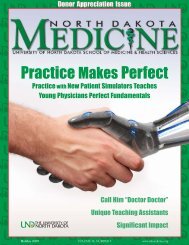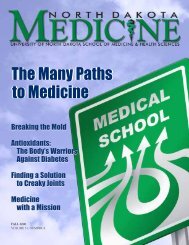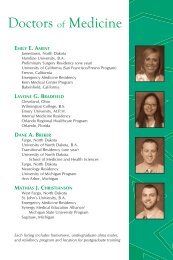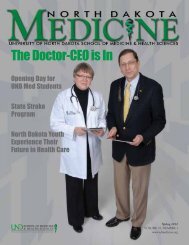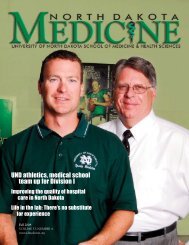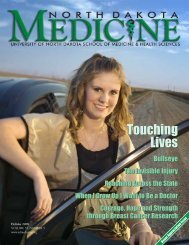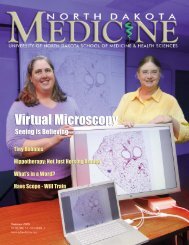Layout 1 (Page 1) - North Dakota Medicine
Layout 1 (Page 1) - North Dakota Medicine
Layout 1 (Page 1) - North Dakota Medicine
Create successful ePaper yourself
Turn your PDF publications into a flip-book with our unique Google optimized e-Paper software.
to alternative treatment methods early on, so they become<br />
comfortable with them and knowledgeable in their use.<br />
Then, they will be able to combine the best of<br />
pharmaceutical medicine and alternative medicine in their<br />
treatment of patients. It does not have to be ‘either/or.’ It<br />
can be ‘both.’”<br />
The goal is to “naturally incorporate alternative<br />
medicine into their practices,” he says. “There’s so much<br />
more out there that physicians can use -- good therapies that<br />
would help them in their practice and that patients would<br />
love to use” instead of drugs.<br />
Gentler, more benign approach<br />
Fischer is convinced that part of creating a health care<br />
system in our country includes patient care that<br />
encompasses naturopathy, homeopathy, biological<br />
approaches such as herbs, vitamins and supplements,<br />
therapeutic massage and manipulation, traditional Chinese<br />
medicine, Ayurveda as well as mind-body medicine involving<br />
patient support groups and meditation.<br />
“There are gentler, more benign ways of treating<br />
disease than they learn in medical school,” he says. “I want<br />
to blend the best of both worlds – the allopathic with the<br />
alternative.”<br />
“We don’t have drug deficiencies, we have lifestyle<br />
deficiencies,” he says. “People have to take control of their<br />
own health. The two pillars of good health are diet and<br />
exercise. Doctors cannot give you good heatlh. They can<br />
point the direction, but only you can give yourself good<br />
health. It is not a gift; it is a choice.”<br />
Charles Christianson, MD, associate dean for clinical<br />
education and associate professor of family and community<br />
medicine, Grand Forks, who is spearheading the school’s<br />
efforts concerning integrative medicine, echoes this viewpoint,<br />
noting, “Our students need familiarity with these modalities.<br />
“Students who understand these modalities are nonjudgmental<br />
and comfortable getting history from patients”<br />
that includes their use of alternative treatments, he says.<br />
Studies show that Americans make more visits to<br />
complementary and alternative health providers than to<br />
primary care physicians.<br />
“We intend to take what’s proven in the field of<br />
complementary and alternative medicine and integrate it<br />
into the practice of allopathic medicine.”<br />
Weil Grant Expands Integrative <strong>Medicine</strong> at UND<br />
THE UND CENTER FOR FAMILY MEDICINE-MINOT HAS<br />
received a $15,000 grant from the Weil Foundation to<br />
plan a formal program to teach integrative medicine to<br />
medical students and physicians-in-training.<br />
Integrative medicine is a healing-oriented approach<br />
to medicine that takes into account the whole person –<br />
mind, body and spirit – including all aspects of lifestyle,<br />
says Neena Thomas-Eapen, MD, FAAP (Family <strong>Medicine</strong><br />
Residency ‘02), director of the project and assistant<br />
professor of family and community medicine, UND<br />
Center for Family <strong>Medicine</strong>-Minot. It emphasizes the<br />
therapeutic relationship between the patient and the<br />
doctor, and makes use of all appropriate therapies, both<br />
conventional and alternative.<br />
The grant will be used to explore a collaboration<br />
with the Arizona Center for Integrative <strong>Medicine</strong> at the<br />
University of Arizona which may lead to development of<br />
a fellowship program or extend training in integrative<br />
medicine. Thomas-Eapen is a senior graduate fellow of<br />
the Program in Integrative <strong>Medicine</strong>. In 2007 she<br />
completed the Residential Fellowship Program in<br />
Integrative <strong>Medicine</strong>, founded by Andrew Weil, MD.<br />
“Because of this grant, patients who see me at the<br />
clinic will receive more health-, wellness- and preventiveoriented,<br />
whole-person care,” Thomas-Eapen says. “They<br />
will have the freedom to discuss and explore their<br />
options from all<br />
aspects, like<br />
nutrition, botanicals,<br />
mind-body<br />
techniques<br />
including clinical<br />
hypnosis, spirituality<br />
and alternative and<br />
complementary<br />
therapies in addition<br />
to everything that<br />
happens in a<br />
conventional<br />
primary care setting.<br />
“We hope that<br />
the education of the<br />
doctors and residents<br />
will lead to better<br />
Neena Thomas-Eapen<br />
whole-person care<br />
for the patients and help the patients to discuss their<br />
options with doctors more openly, both conventional and<br />
alternative.”<br />
The Weil Foundation is a not-for-profit organization<br />
founded by Weil as a long-term funding mechanism for<br />
the advancement of integrative medicine through training,<br />
research, the education of the public, and policy reform.<br />
6 NORTH DAKOTA MEDICINE Spring 2009



